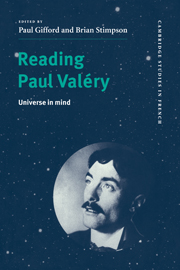Book contents
- Frontmatter
- Contents
- Contributors
- Abbreviations
- Introduction
- PART 1 SELF-SCIENCE
- 1 Towards a biography of the mind
- 2 Thinking-writing games of the Cahiers
- 3 Paradigms of the self: Valéry's mythical models
- 4 The fascination of science
- 5 An art of rethinking: Valéry's ‘negative philosophy’
- PART 2 SELF-WRITINGS
- PART 3 BODY, MIND, WORLD
- Conclusion
- Bibliography
- Index
- Cambridge Cultural Social Studies
4 - The fascination of science
Published online by Cambridge University Press: 04 August 2010
- Frontmatter
- Contents
- Contributors
- Abbreviations
- Introduction
- PART 1 SELF-SCIENCE
- 1 Towards a biography of the mind
- 2 Thinking-writing games of the Cahiers
- 3 Paradigms of the self: Valéry's mythical models
- 4 The fascination of science
- 5 An art of rethinking: Valéry's ‘negative philosophy’
- PART 2 SELF-WRITINGS
- PART 3 BODY, MIND, WORLD
- Conclusion
- Bibliography
- Index
- Cambridge Cultural Social Studies
Summary
‘Mais la science est due … à des imaginations de poèes’
(C2, P. 838)Valéry is undoubtedly one of the most striking examples in twentieth century literature of a writer more interested in science than in literature itself. He felt himself privileged to follow, as it were, over the shoulders of the creators of science, one of the greatest intellectual adventures of human history: the appearance in our mental firmament, from the last years of the nineteenth century to the end of our own, of a whole series of new scientific models, each one more surprising, more exciting and more philosophically suggestive than the one before.
The role of scientific modelling in the genesis and evolution of Valéry's own ‘System’ has been extensively studied. What he seeks in science is not a loose analogy between the laws of mathematics, physics or chemistry and those of mental processes, but the fruitful lesson offered to us by what he calls ‘leur rigueur, leur tension, leur difficulté pure, leurs bonnes manières de définir, leur recherche des opérations’ (C2, p. 834). What Valéry borrows from science is, he says, ‘surtout des manières de voir et de raisonner’(‘above all, ways of seeing and reasoning’) (p. 858). He also writes, significantly, of a case we shall have a chance to examine more closely: ‘Ce que je cherche dans la physique (ex[emple]: p[rincipe] de la relativé) c'est de quoi aborder les problèmes du moi’ (p. 845).
- Type
- Chapter
- Information
- Reading Paul ValéryUniverse in Mind, pp. 70 - 84Publisher: Cambridge University PressPrint publication year: 1999
- 1
- Cited by



